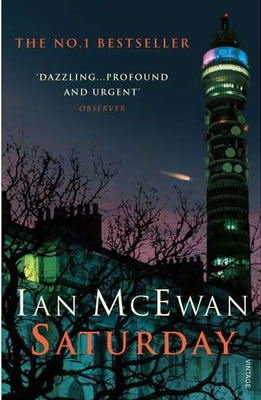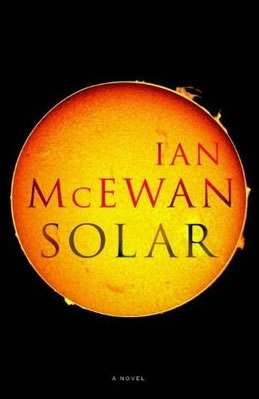 Ian McEwan has long been poking his middle-class readers with a pointy stick, goading them into examining their prejudices, preoccupations and failings. A list of his themes reads like the curriculum of a course in moral panic: paedophiles, the nuclear threat, abducted children, euthanasia, urban decay, resurgent Nazism, predatory stalkers, post-9/11 paranoia, dementia and, most recently, climate change. Along with highlighting their pet obsessions, he taunts them for their disdain of science. “You 'arts' people, you’re not only ignorant of these magnificent things, you’re rather proud of knowing nothing,” says physicist Thelma Darke in The Child in Time on McEwan’s behalf.
Ian McEwan has long been poking his middle-class readers with a pointy stick, goading them into examining their prejudices, preoccupations and failings. A list of his themes reads like the curriculum of a course in moral panic: paedophiles, the nuclear threat, abducted children, euthanasia, urban decay, resurgent Nazism, predatory stalkers, post-9/11 paranoia, dementia and, most recently, climate change. Along with highlighting their pet obsessions, he taunts them for their disdain of science. “You 'arts' people, you’re not only ignorant of these magnificent things, you’re rather proud of knowing nothing,” says physicist Thelma Darke in The Child in Time on McEwan’s behalf.
One of relatively few scientifically literate novelists writing in English, McEwan is a keen advocate of science and the scientific tradition. He has written in the press of the need for educated people to understand where modern science has come from – to understand Newton as well as Hawking. He harks back to a time before CP Snow’s two cultures diverged. Shakespeare and Donne, as Thelma says, would have “plundered this new science [wave functions and relativity] for their imagery” – and their readers would have understood them.
McEwan has plundered the storehouse for many years. The science in his earliest work is not rigorous, and often playful: in “Solid Geometry”, a disenchanted husband folds his wife into a special geometric pattern that usefully causes her to disappear into another dimension (she thinks they are trying out an obscure sex position); in “Reflections of a Kept Ape” a woman gives up sex with a gorilla because it aggravates her thrush (which it may well do). Later, the science becomes more integral and more serious.
 His early Gothic tales of characters who stalk the moral hinterland, fucking their siblings and cutting people up, shaded into a clinical interest in deviant psychology, and McEwan began to nail his characters to specific psychotic and neurological conditions. In Enduring Love, Jed suffers from de Clerambault's syndrome [erotomania], a condition that produces irrational, obsessive love. In Atonement, the elderly Briony has vascular dementia, the same condition that afflicts Perowne’s mother in Saturday and from which McEwan’s own mother suffered. Also in Saturday, the violent Baxter is showing early signs of Huntingdon’s disease, immediately evident to the neurosurgeon Perowne.
His early Gothic tales of characters who stalk the moral hinterland, fucking their siblings and cutting people up, shaded into a clinical interest in deviant psychology, and McEwan began to nail his characters to specific psychotic and neurological conditions. In Enduring Love, Jed suffers from de Clerambault's syndrome [erotomania], a condition that produces irrational, obsessive love. In Atonement, the elderly Briony has vascular dementia, the same condition that afflicts Perowne’s mother in Saturday and from which McEwan’s own mother suffered. Also in Saturday, the violent Baxter is showing early signs of Huntingdon’s disease, immediately evident to the neurosurgeon Perowne.
He goes into considerable detail and doesn’t shirk from blending deep physics and biology with poetic language. He crafts some startling treasures after going a-plundering in the coffers of science:
“This is how the brilliant machinery of being is undone by the tiniest of faulty cogs, the insidious whisper of ruin, a single bad idea lodged in every cell, on every chromosome four.” (Saturday).
“God’s greatest gift to us is surely this, that a photon striking a semiconductor releases an electron. The laws of physics are so benign, so generous.” (Solar)
But he can also get it very wrong:“They had eventually seen the limitations of strings and embraced superstrings and heterotic string theory to arrive by these threads in the cavernous maternal shelter of M-theory.” (Solar)
There is nothing here on which the unscientific reader can hang any meaning.
Some detailed science is all well and good, but you can take things too far. The neurology in Saturday gets rather trying, but in Solar the physics becomes intrusive and ostentatious, even boring. For those who know the science, there is a frisson of smugness, but even this wears thin through over-use. There are extended scientific discursions, and pages that read like a dreary physics journal.
McEwan identified the problem of the scientist’s language obfuscating the message in The Child in Time: “At first she was patient with him, and he struggled hard. Then, slowly, she began to leave him behind and speak of Green’s function, Clifford and fermionic algebrae, matrices and quaternions. Soon she abandoned all pretence of communication.”
Yet McEwan did a Thelma himself 20 years later:“Ten dimensions, then with a backward glance at the super-gravity men, eleven! Dimensions tightly wrapped on six circles, the rediscovery of Kaluza and Klein from the nineteen twenties, the delightful intricacies of Calabi-Yau manifolds and orbifolds!” (Solar)
A chunk of Solar even appeared in an article on solar power that McEwan published in the Guardian in 2008. Is this a meta-comment on the correspondence between fiction and discursive non-fiction? It doesn’t work; it looks like showing off, and excludes less scientifically-minded readers. It’s a shame he didn’t have an editor brave enough to trim the excesses.
 If a writer takes it upon himself to taunt his readers about their lack of scientific knowledge, doesn’t he then have a duty of care to make sure his science is entirely accurate and can’t be misconstrued? There are some issues of accuracy which are difficult to untangle given the fictional context. In Enduring Love, Joe contemplates a handful of soil, saying there are probably 10 million bacteria and fungi in the single handful. He is very wrong: there are 40-100 million prokaryotes in every gram of soil, so probably a good 500-2,000 million in a handful. Is it Joe or McEwan who got it wrong? Briony’s condition as it is portrayed is not typical vascular dementia. It’s not clear whether McEwan intended it to be atypical or it’s just wrong, but for Saturday he employed a neurosurgeon to teach him what he needed to portray Baxter’s condition accurately.
If a writer takes it upon himself to taunt his readers about their lack of scientific knowledge, doesn’t he then have a duty of care to make sure his science is entirely accurate and can’t be misconstrued? There are some issues of accuracy which are difficult to untangle given the fictional context. In Enduring Love, Joe contemplates a handful of soil, saying there are probably 10 million bacteria and fungi in the single handful. He is very wrong: there are 40-100 million prokaryotes in every gram of soil, so probably a good 500-2,000 million in a handful. Is it Joe or McEwan who got it wrong? Briony’s condition as it is portrayed is not typical vascular dementia. It’s not clear whether McEwan intended it to be atypical or it’s just wrong, but for Saturday he employed a neurosurgeon to teach him what he needed to portray Baxter’s condition accurately.
Some passages are open to misunderstanding by the uninitiated:“Einstein failed with his unified field theory [to reconcile quantum mechanics and relativity]” (The Child in Time).
This seems to suggest that Einstein actually had a unified field theory. He didn’t – he struggled for decades to develop one and then gave up, saying it was a task he had to leave for someone else to complete (a line Beard echoes near the end of Solar, making another in-joke for Einstein scholars).
Beard’s Nobel Prize was awarded for the Beard-Einstein Conflation, supposedly an adaptation of Einstein’s Nobel-prize winning work on the photoelectric effect. The Conflation, of course, does not exist. But it is worked into real science that is (to most readers) so obscure that it is hard to see where science fact ends and science fiction begins. Those who don’t know the science will have been confounded or duped, which sits uncomfortably with McEwan’s contention that we should all know a reasonable amount of science. It’s not the first time McEwan has invented science convincingly. An article “reproduced” from a non-existent academic journal purporting to present the case behind Enduring Love fooled many reviewers, including some writing in psychology journals. One reviewer even grumbled that by identifying Jed’s condition, McEwan “sap[ped] the story of its energy.” (It’s not a new position – Tennyson was criticised for being unpoetic for using scientific imagery in In Memoriam 150 years earlier.) We might say this home goal proves McEwan’s point, but things have moved on since the time of Shakespeare and Donne: none of us can know everything any longer. It is neither generous nor realistic to assume his readers can be as familiar with neurology as with quantum mechanics.
There are issues of plausibility, too. Would Perowne really operate on Baxter when he was drunk? And of appropriateness – there is a lot of Einstein and physics in Solar, but the innovative technology is supposed to mimic photosynthesis in nanotechnology. The key to this is surely biochemistry, not the uncontroversial photoelectric effect, but McEwan is a fan of Einstein and so Einstein gets the gig and there is only half a sentence on photosynthesis. “They did not know enough, but they knew too much to have anyone to talk to,” Beard thinks of some characters in Solar. It seems to be true of the book itself.
 Science is central to Solar’s plot, ideology and characterisation, as it was beginning to be in Saturday. Beard’s gluttony and lasciviousness mirror the greed of all humanity, careering towards disaster in a global consumerist pig-out, and unable to embrace moderation even when faced with imminent disaster. When there is a chance of salvation, an argument about IPR, money and personal glory wrecks it. Human nature undermines humanity’s best endeavours. This is surely a more relevant and useful point than that the reader doesn’t know whether there are ten or eleven dimensions?
Science is central to Solar’s plot, ideology and characterisation, as it was beginning to be in Saturday. Beard’s gluttony and lasciviousness mirror the greed of all humanity, careering towards disaster in a global consumerist pig-out, and unable to embrace moderation even when faced with imminent disaster. When there is a chance of salvation, an argument about IPR, money and personal glory wrecks it. Human nature undermines humanity’s best endeavours. This is surely a more relevant and useful point than that the reader doesn’t know whether there are ten or eleven dimensions?
The metaphor that everyone (including McEwan) has seized on as central to Solar is the chaotic boot room; superficially civilised people steal each other’s Arctic-wear in a frenzy of selfishness. As Beard remarks – as though the point needed to be laboured - how can humanity hope to save itself from climate change when it can’t sort out its thermals? But a better iconic metaphor is Beard pissing in the Arctic wind; that’s what humanity is really doing with its pitiful attempts to convince itself the climate can be saved by packing the recycling into the SUV. Like Beard, we risk having our collective penis frozen off and feel it rolling down our trouser leg. And then it will all be too late. McEwan wants us to embrace scientific knowledge and let it redeem us, personally and as a species. Relativity, entanglement and other intellectual delights are woven through Enduring Love and The Child in Time enriching the narrative but excluding no-one. They might coax us to ask more. Solar – with its sandal-wearing geeks, greedy corporate scientists and impenetrable vocabulary - offers an altogether less appealing prospect. It mocks the middle class liberals who feel their lack of scientific knowledge and feel bad about it, yet puts “real” science beyond their reach. Solar is as poor an advertisement for a literature that incorporates science as it is for human nature

